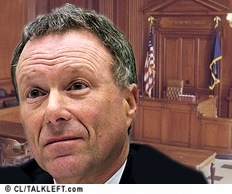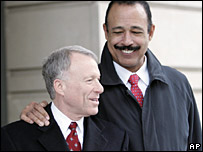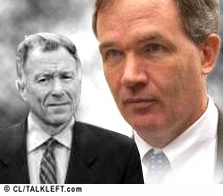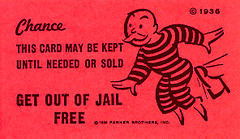Home / Lewis Libby Trial Coverage
Subsections:

Scooter Libby can vote again. The Governor of Virginia's list of pardons, clemencies and restoration of rights for 2012 is contained in this report of the Virginia legislature, released Feb. 23. Libby's rights were restored in November, 2012.
Virginia's rules for restoration or rights are here.
Libby's prison sentence was commuted by then President G.W. Bush in 2007, hours after his request for an appeal bond was denied by the Court of Appeals, meaning he'd have to go to prison while waiting for the appeal decision. Many people, myself included, saw the commutation as total disrespect for the law. [More....]
(11 comments, 812 words in story) There's More :: Permalink :: Comments
Marcy Wheeler at Empty Wheel dissects the article in Time Magazine about the waning days of Bush and Cheney, as it relates to the Scooter Libby non-pardon. Cheney pleaded and cajoled for his buddy, Bush didn't want to give him any more breaks than the sentence commutation he had already ordered.
But the fight over the pardon was also a prelude to the difficult questions about justice and national security inherited by the Obama Administration: How closely should the nation examine the actions of government officials who took steps — legal or possibly illegal — to defend the nation's security during the war on terrorism? The Libby investigation, which began nearly six years ago, went to the heart of whether the Bush Administration misled the public in making its case to invade Iraq. But other Bush-era policies are still coming under legal scrutiny. [More...]
(11 comments, 489 words in story) There's More :: Permalink :: Comments

I was checking White Collar Crime Blog to get Professor Ellen Podgor's take on the Don Siegelman decision, but learned she's at the ABA White Collar Crime conference in San Francisco. One panel she attended was about the white collar trials of 2007. Ted Wells, Scooter Libby's lawyer, was one of the panelists. She writes:
The eight male speakers covered the cases of Michael Reyes (Brocade), Joseph Nacchio (Qwest), Scooter Libby and the KPMG defendants. One recurring theme was what I call the "the context of the case."
For example, in discussing the Scooter Libby case, Theodore V. Wells, Jr. noted how the Scooter Libby case could be seen as a proxy for how people felt about President Bush and the war. It was a "he said-she said" case on a 20 second phone call - but the timing of the trial was important.
[More...]
(6 comments, 573 words in story) There's More :: Permalink :: Comments


The New York Daily News reports that aides to Dick Cheney are saying he's really angry that Bush wouldn't give Scooter Libby a full pardon and kept the pressure on Bush until the last minute.
After repeatedly telling Cheney his mind was made up, Bush became so exasperated with Cheney's persistence he told aides he didn't want to discuss the matter any further. The unsuccessful full-court press left Cheney bitter. "He's furious with Bush," a Cheney source told The News. "He's really angry about it and decided he's going to say what he believes."
[More...]
(27 comments, 254 words in story) There's More :: Permalink :: Comments
Via Christopher Bateman at Vanity Fair: In his tell-all book about the Bush Administration, former Press Secretary Scott McClellan has harsh words for President Bush's commutation of Scooter Libby's prison sentence in the Valerie Plame leaks case:
It’s … clear to me that Scooter Libby was guilty of the perjury and obstruction crimes for which he was convicted. When the president commuted Libby’s prison sentence and thereby protected him from serving even one day behind bars, I was disappointed. This kind of special treatment undermines our system of justice…. President Bush certainly has the right and the power to commute Libby’s sentence. But in choosing to do so, he sent an unfortunate message to America and the world—that in the United States criminal behavior on behalf of a political cause may go unpunished if those who support that cause have the power to make it happen.
At the time, John McCain agreed with Bush: [More...]
(32 comments, 216 words in story) There's More :: Permalink :: Comments

I. Lewis "Scooter" Libby was disbarred today. The court said he perjury conviction was a crime of moral turpitude.
The former White House aide was found guilty a year ago of obstruction of justice and lying. Those are considered crimes involving "moral turpitude" that under the law require disbarment, the District of Columbia Court of Appeals ruled.
The court had previously suspended Libby from the practice of law in Washington. President George W. Bush in July commuted Libby's 2-1/2-year prison sentence, enraging Democrats who accused Bush of abusing his power.
Libby did not challenge the disbarment.
(14 comments) Permalink :: Comments
Scooter Libby's lawyer has announced they will drop the appeal of Libby's felony convictions.
It's too expensive and draining on his "young family."
I suspect this means Scooter has lined up another job and doesn't need his law license back.
Update: Joe Wilson thinks it means Libby's getting a pardon from Bush (received by e-mail, no link yet): [more]
(8 comments, 232 words in story) There's More :: Permalink :: Comments
TPM has the goods on how Victor Rita (now serving a 33 months sentence), convicted of perjury and obstruction of justice, was "less equal than" Scooter Libby (now scot free), also convicted of perjury and obstruction of justice, providing this video of Rita's attorney, Tom Cochran, a public defender from North Carolina, testifying at today's House hearing on the commutation of Libby:
(5 comments) Permalink :: Comments

The House Judiciary Committee's hearing on the use and abuse of presidential dlemency authority for executive branch officials, to include the Scooter Libby sentence commutation, begins at 12:00 pm ET.
You can watch the live webcast here.
I've already expressed my opinion on the witness list, and how I don't think it will shed any light on Bush's motives in granting the commutation.
I think it is worthwhile to listen to the testimony of Joe Wilson and law professor Doug Berman.
Unless the President waives executive privilege on the Libby commutation as Rep. Conyers asked him to do in this letter (pdf), and as President Clinton did in similar hearings into his exercise of clemency, I don't think we get very far today.

The briefs are in and both the Government and Team Libby, as well as White House Counsel Fred Fielding who submitted a letter, agree: Libby's two year term supervised release is valid and he should begin serving it immediately.
Fitz's brief is here (pdf), Libby's is here, and Fred Fielding's letter (which he sent to both sides and filed with the court even though neither side took Judge Walton up on his suggestion and asked for the White House's opinion) is here.
I'd say it's a done deal. Libby will be on supervised release before the week is out.
For what supervised release means for Libby, see my earlier post, Life on Supervised Release. For TalkLeft's analysis of the issue of the validity of the supervised release term in light of the commutation see Suggestions for Judge Walton on Libby's Supervised Release.
(10 comments) Permalink :: Comments

Michael Iskifoff covers the Scooter Libby sentence commutation in Newsweek today. As to the role Dick Cheney may have played, he writes:
Hanging over his deliberations was Cheney, who had said he was "very disappointed" with the jury's verdict. Cheney did not directly weigh in with Fielding, but nobody involved had any doubt where he stood. "I'm not sure Bush had a choice," says one of the advisers. "If he didn't act, it would have caused a fracture with the vice president." (White House officials and Cheney declined to comment. "As you know, we don't discuss internal deliberations," a Cheney spokeswoman tells NEWSWEEK.)
One of my first thoughts after hearing about the commutation was that it showed Dick Cheney still had a lot of clout. Now I'm wondering how he'll use it to obstruct the Congressional hearings next week. Cheney has a penchant for hiding behind executive privilege.
Update: Josh Marshall adds some thoughts on this.
(4 comments) Permalink :: Comments

Crooks and Liars reports that Sen. Charles Schumer said on Face the Nation today that the Committee may call Libby prosecutor Patrick Fitzgerald to testify about Bush and Cheney in the context of the Valerie Plame investigation.
If they do, I hope they ask him whether he and Team Libby had any discussions after Libby's conviction about Libby providing information to the Government on Cheney and Bush's role in PlameGate in exchange for the Government's filing of a Rule 35 motion for sentence reduction.
Rule 35 provides in part:
(1) In General. Upon the government's motion made within one year of sentencing, the court may reduce a sentence if:
(A) the defendant, after sentencing, provided substantial assistance in investigating or prosecuting another person;
I can't think of any reason off the top of my head why that information would be privileged. As a federal court in California ruled in a case I cite all the time in discovery motions, almost always with successful results:
More...
(8 comments, 547 words in story) There's More :: Permalink :: Comments
| Next 12 >> |







